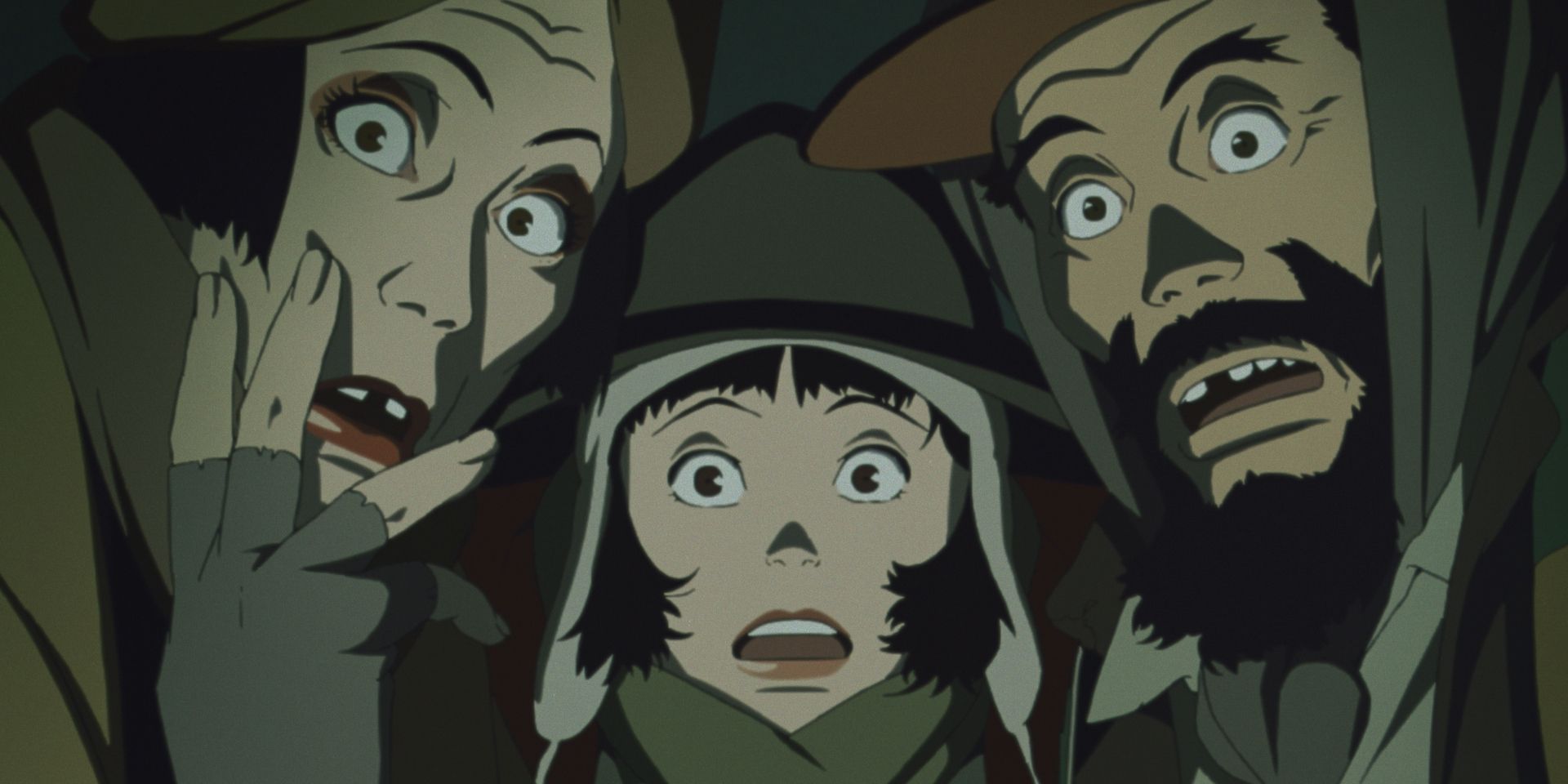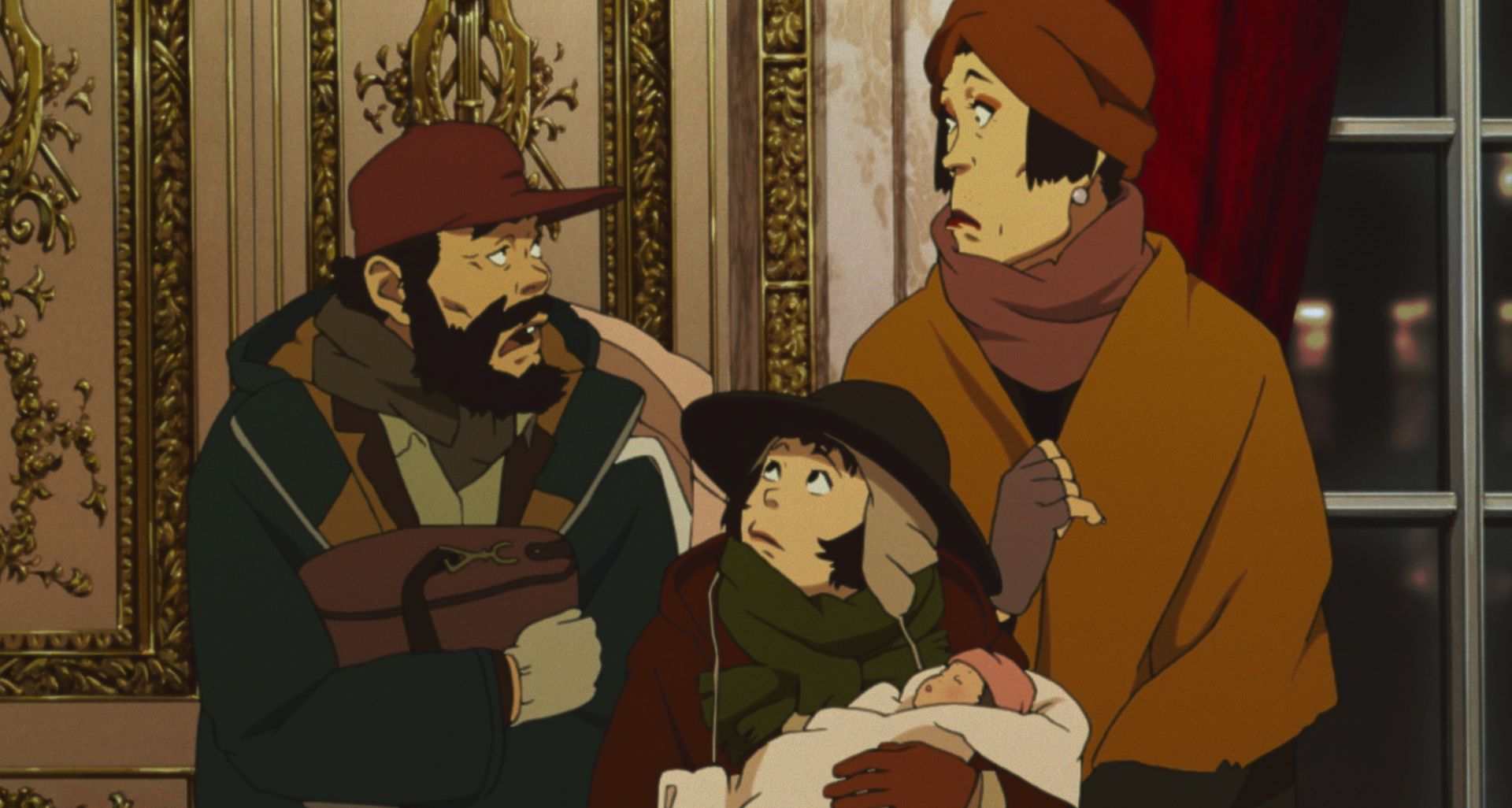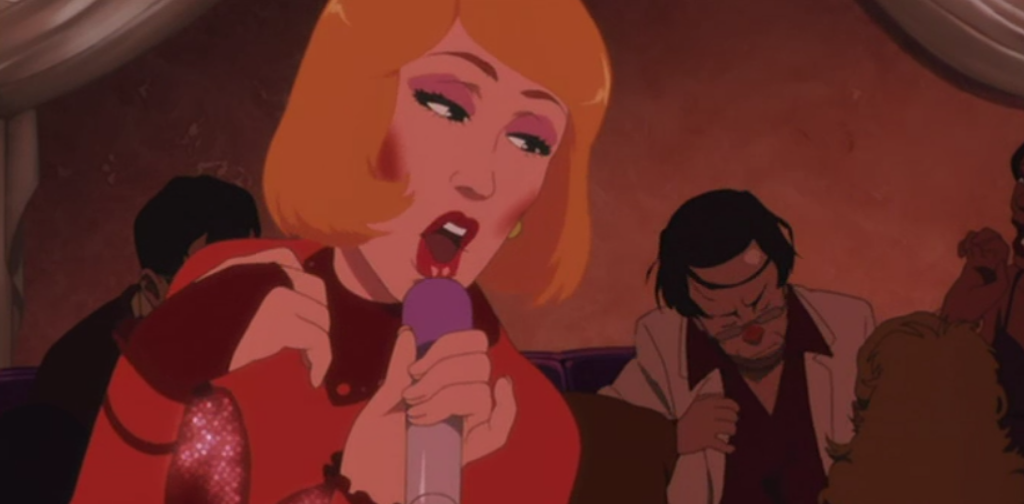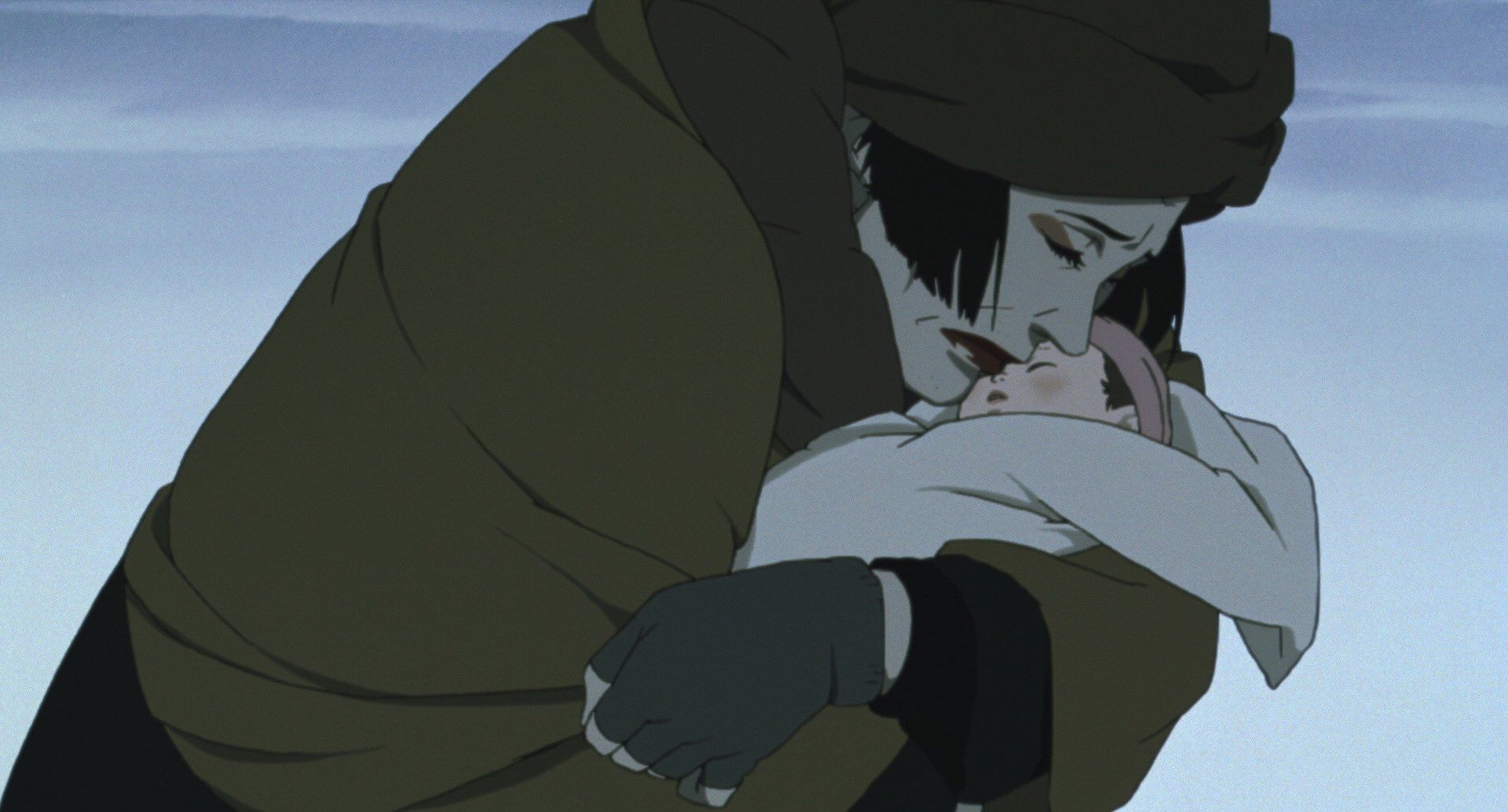In the nearly 20 years since Satoshi Kon's Tokyo Godfathers was released, the film has become something of a Christmas classic for anime fans. A story that's both heartwarming and heartbreaking, Tokyo Godfathers follows an unconventional family made of up three members of the homeless community: Gin, the crusty pessimist; Hana, the melodramatic optimist; and Miyuki, the moody teen realist and, ironically, perhaps the most responsible of the trio. Together, they discover, and try to return, an abandoned baby to her parents during the festive period.
At the soft center of Tokyo Godfathers' harder-hitting edges is undoubtedly the character of Hana. And through Hana, we also meet Mother, the loving and lively owner of a gay bar in which her surrogate daughter used to work. Though broadly a tale of family and companionship, this is where the film finds power in specificity; particularly the largely sensitive and compassionate way that Kon and co-scriptwriter Keiko Nobumoto (Cowboy Bebop, Wolf's Rain) characterize Hana, as well as the communities to which she belongs.
That isn't to say they aren't faults to be found, though. Hana was done a huge disservice by originally being voiced by cisgender male voice actors in both the film's Japanese and English-language versions. To top it off, at least one English subbed version not only misgendered Hana but also mistranslated an insult thrown at her in Japanese to an offensive slur in English.
For these reasons, and at a time of increased awareness and understanding of the power of representation in media, GKIDS' new dub of the film is a welcome elevation of an already masterful classic, with transgender activist Shakina Nayfack (Difficult People) in the role of Hana and gender theorist Kate Bornstein (Gender Outlaw: On Men, Women and the Rest of Us) in the role of Mother.
Ahead of the film's release on Blu-ray for the first time, CBR spoke to both Shakina and Kate about Tokyo Godfathers' legacy and the process of reclaiming its LGBTQ characters.
CBR: Tokyo Godfathers has become a real Christmas cult classic for anime fans. Was either of you familiar with it before this?
Shakina Nayfack: No, not at all. [But I watched it] instantly. I went and found it on my own. And I fell in love with it.
Kate Bornstein: I was not familiar with it. I wanted to see it on the big screen after we made our dub of it, and then coronavirus happened and I didn't want to go to the theater.
Could you tell me a bit about the characters that you play -- Hana and Mother: What were your first impressions of them and how would you describe their relationship?
SN: Hana is a homeless trans woman or, as I'd rather say, a transgender woman experiencing homelessness. She was a performer in a nightclub long ago but she lost her lover and now lives a grumpy old drunk who she totally adores and a young runaway who she helps takes care of. And then she finds, along with her two companions, a baby that has been discarded and decides that she's going to take a maternal quest on to find the mother of the child.
My first impression was... where has she been my whole life? She's such an incredible character; a huge strong, loud, spirited, faithful, loyal and determined trans woman. Such an inspiration. So much joy and so much rage. And I was like, I'm so glad to be meeting this woman. From my point of view to [her relationship with Mother], it's just really iconic because Kate -- Auntie Kate, to me -- has been a hero and a legend to me for decades for my trans existing, as a pioneer in trans scholarship and trans performance and trans theory. And so for her to then play Hana's mother figure was just such a wonderful dream -- to be able to bring my mentor onto a project where she could play my mentor. How cool is that?
Was that a deliberate casting choice, then, to create a more genuine connection between the two characters?
SN: I can't speak on behalf of GKIDS but I think when they brought me onto the project I did ask them, do you have anyone for this part yet? And they said no, and I said, can I just recommend the great Kate Bornstein.
Did you record together at all, or was it all done separately?
SN: No, we just crossed paths briefly in the lobby!
KB: The way it's done, there's a studio that has a microphone for one person, and it's done line-by-line. And you study the scene and then they go, "Right, three, two, one... Go!" And you do your line as you're looking at what your character is doing, and it's almost like being a ventriloquist. So, no there's only one person in the recording studio at a time. That's the way they did for us.
In the trans world -- in the queer world -- we very often alienate people and our family and friends in our circle before transition or come out and we're kind of afloat. So, we tend to look for support within the community of people who have done the same thing. The job, if it's a job, of the elders in our community is to understand that and be "mother" and be "auntie," and we take these young creatures under our wings and we say, "OK, all right -- c'mon. I'm taking care of you. You take care of me." And we pass on whatever we can and we accept whatever support we can get from them. And that's what I'm doing. I'm 72 right now, and I've had my arm around Shakina for years now -- a brilliant, young talent, setting fire to the world. This is a fierce daughter-niece of mine.
Speaking to [Mother's] character, all I had in my heart was love.
It seems like you were both perfectly cast in these roles -- almost like they were made for you both. With that in mind, what was your approach to stepping into them? Did you want to capture anything of the original voices at all, or completely make them your own?
SN: For Hana, the actor who played her in the original Japanese cast had this booming, deep, guttural voice that, in some ways, could be conceived as a caricature to a trans woman. But it felt so authentic and, like, full of love in the portrayal of the original that I thought I wanted to challenge myself as a trans woman -- and we're often coached to speak in higher registers of our voice.
And it was an opportunity to voice a character that had been established with this really deep, resonant voice. And so I was excited to match that in my own way and kind of bring some color and breath to the voice that felt authentic to an American trans woman of today but also honor that aspect of the character that wasn't mentioned in the original, which was just this gutsy and guttural vocal range.
KB: Mother is a clown character. That's the kind of character I play! And the temptation was to do a real clownish voice. The director kept saying, "no, no, just let your art come through on it. Just your plain voice." And, so what you see is a whole lot down to the director and. And I'm grateful for that because it would have been easy to slide into caricature.
Yes, but they're still comedic performances, which is to both of your credit. And with that humor, Satoshi Kon treats these characters who live on the fringes of society with such humanity. They’re both sympathetic but not patronized -- none of their edges are smoothed to make the whole thing sappy. But where this dub improves upon this, I think, is giving them even more soul, and you can tell a lot of care has gone into casting the right people. I know, for instance, there were some small but significant changes made to Hana's lines, as well as some lines said to her or about her. How involved were you in this process, Shakina?
SN: We wrote some lines here and there but with discussion, and it was always down to a question of the original translation and the moving of the mouth in the animation. And the question of context. We're trying to capture the reality of Japan 15 years ago and also make a film that feels appropriate to release in 2020. So, even if they were really quick decisions that were being made on the fly, they would be evaluated. Sometimes we would we could just record multiple options and kind of wait to see how this plays out. But yeah, I think a lot of attention was paid to restore some of Hana's power and also sort of make her not just in on the joke but almost the teller of the joke.
I especially liked, “I’m just a queer who cares!” Was that a new one?
SN: Yeah, we definitely came up with that one in the studio.
Kate, were there any changes to Mother's character along similar lines?
KB: No. It's a thoroughly delightful character. I think it's a well-written part. You know, she's a little goofy, but she's all heart.
Family is the thing glue that holds this whole film together and it’s a universal theme that’s also very appropriate for a Christmas film. But as you touched upon earlier, Kate, when describing Mother, its themes of abandonment and chosen families probably resonate more with an LGBTQ audience, in particular. What do you think the film’s enduring appeal is?
SN: I think that people love an underdog story. There's something so universal about the struggle of these three characters, and it's wonderful that these central figures of this underdog story happen to actually be people on the fringes who don't get the spotlight. And that's really great writing. And then, I think that the film has so much heart and we need that 24/7, 365. So, I think Tokyo Godfathers should be considered more than just a cult classic Christmas movie. You know, it's a great watch. Now more than ever.
KB: I can only say, yes. That.
In terms of greater representation of trans and gender diversity, what areas do you both think the media still needs to improve on?
SN: I look forward to the day when trans characters exist and their transness isn't part of a plot or a device used to further the narrative. And so I think we just need more trans characters that are more complex. I think we need more trans creators [who are] given a voice in the writing and editing and producing and directing so that those characters are as well-rounded as any other character.
KB: I would add that anime is the perfect medium to increase trans representation, going way back to Ranma 1/2. Trans characters have always been part of anime. And that marvelous blend that gets celebrated are elements of trans comedy. Yes, it's sometimes very comical, but the comedy doesn't have to be mean-spirited. The comedy can be joined in. Many trans people have learned to laugh at their own foibles. It's when someone points and laughs and tries to be demeaning -- that hurts. That's when it hurts. So less of that and more of the good nature[d stuff]. I think that's starting to happen and I'd like to see more of it. I'm just speaking to anime now but that would apply across the board.
Are there any manga and anime series, besides Ramna 1/2, that you'd recommend for those who are looking for positive examples of trans representation?
KB: My Adrongynous Boyfriend is a recent one... That's a fabulous read. The artwork is terrific, it's smart, it's funny. That's an example of using comedy with a good heart. It also highlights what is becoming more and more visible within the world of trans, which is what we'll call non-binary or genderqueer or androgynous. There are parts of the trans community who are men and women -- they've fought long and hard to be men and women. And, that's what's usually seen in the world. But there are other parts of the trans community who really don't settle into either one of those categories. And a good-spirited representation of those is dawning.
Directed by acclaimed filmmaker Satoshi Kon (Perfect Blue, Paprika), written by Kon and Keiko Nobumoto (Cowboy Bebop) and featuring a score by Keiichi Suzuki, Tokyo Godfathers is available now for the first time on Blu-ray. The new English-language dub from GKIDS features Jon Avner as Gin, Victoria Grace as Miyuki, Shakina Nayfack as Hana, Kate Bornstein as Mother, Crispin Freeman as Miyuki's Father, David Manis as "Old Man," Jamieson Price as Oota and Kirk Thornton as Yasuo.




